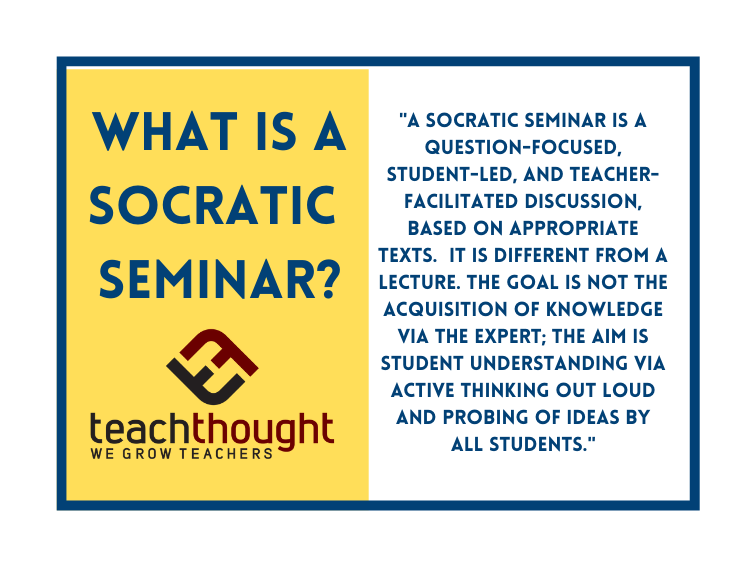Socratic Seminar
What it is, what research supports it, and a simple, teacher-ready way to run one.
Socratic Seminar
Overview: Socratic seminar is a structured, student-led dialogue that examines a shared text, idea, or problem through open questions and evidence-based reasoning. It prioritizes collaborative meaning-making over recitation or teacher-delivered answers.
Definition: A Socratic seminar engages learners in collective inquiry by posing arguable questions, citing textual or empirical evidence, and responding to peers’ claims. The approach—rooted in the Socratic method and developed in modern classrooms through dialogic teaching and the Paideia tradition—aims to surface assumptions, test interpretations, and build shared understanding through disciplined talk.
Classroom Example: Students read a short story with moral tension. The inner circle discusses the central question, “Which claim about the protagonist’s choice is most defensible—and why?” The outer circle tracks evidence use and offers coaching notes between rounds. Quieter students rotate into a “hot seat” to contribute once with support.
Citation: Murphy, P. K., Wilkinson, I. A., Soter, A. O., Hennessey, M. N., & Alexander, J. F. (2009). Examining the effects of classroom discussion on students’ comprehension of text: A meta-analysis. Journal of Educational Psychology, 101(3), 740–764.
How To Run a Socratic Seminar
Before the Seminar
1. Select a text that invites interpretation
- Choose material with ambiguity, tension, or competing values (short stories, primary sources, policy briefs, data visuals).
- Avoid texts that collapse into recall; aim for texts where reasonable people can disagree.
- Offer access supports (excerpted text, audio) to include diverse readers.
2. Ready the readers
- Have students annotate for claims, evidence, and questions rather than summary.
- Require a short prep: two quotable lines and one arguable question per student.
- Preview norms: cite the text, build on peers, and disagree by probing reasoning.
3. Write high-leverage questions
- Favor open prompts such as “Which claim is strongest, and why?”
- Include at least one synthesis question that connects the text to a contemporary issue.
- Model follow-ups: “What evidence supports that?” “Who can complicate this idea?”
Related resources: Questioning & Inquiry, Bloom’s Taxonomy Verbs, Bloom’s Question Stems
During the Seminar
1. Norms and facilitation moves
- One voice at a time; reference the text directly.
- Use neutral probes: “What evidence supports that claim?” “Who can extend or challenge this?”
- Track participation to support equitable airtime (simple roster ticks work).
2. Roles and support
- Speakers: ask, clarify, synthesize, and cite evidence.
- Observers/coaches: note reasoning quality; pass clarifying questions between rounds.
- Equity supports: a rotating “hot seat” for quieter students; a “listening historian” summarizes major claims.
After the Seminar
1. Quick reflection prompts
- Which peer’s comment changed your thinking, and how?
- What claim did you support with the strongest evidence?
- What will you try differently next time?
2. Lightweight assessment
- Use a 1–4 rubric across three traits: evidence use, reasoning quality, and collaboration.
- Emphasize clear feedback over points in early seminars.
- Include self and peer notes as artifacts of listening and synthesis.
Socratic Seminar Quick Rubric (1–4)
| Trait | 4 | 3 | 2 | 1 |
|---|---|---|---|---|
| Evidence Use | Consistently cites precise passages or data to support claims. | Usually cites relevant evidence; minor vagueness. | Infrequent or general references to the text. | Little to no evidence; opinion only. |
| Reasoning Quality | Explanations are clear, logical, and connect ideas across comments. | Reasoning is generally sound; occasional gaps. | Reasoning is partial or repetitive; limited depth. | Reasoning is unclear or off-topic. |
| Collaboration | Builds on peers, invites others in, and listens actively. | Engages peers respectfully; occasional missed connections. | Minimal engagement with peers’ ideas. | Interrupts, disengages, or dominates. |
